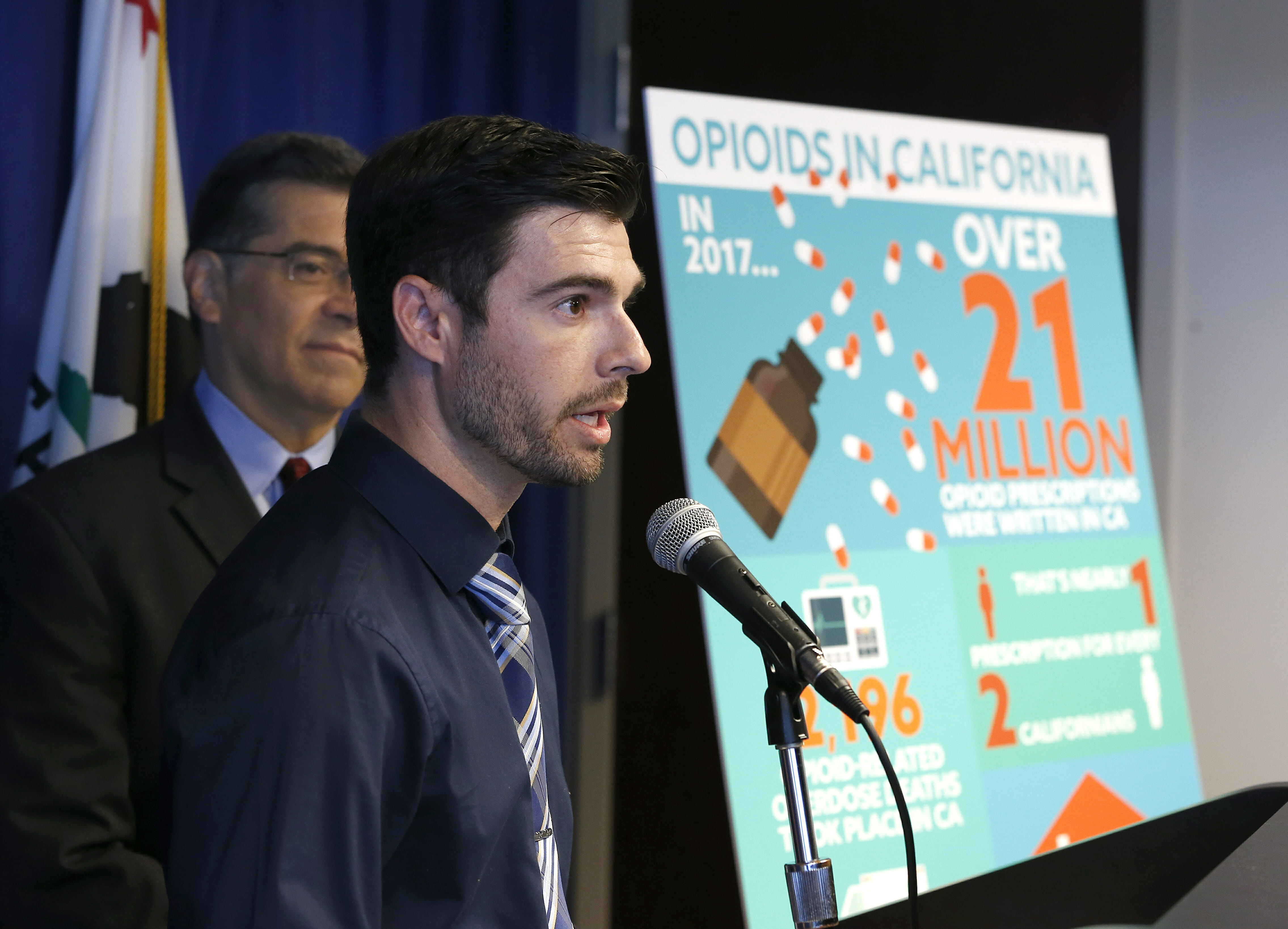
California sues opioid maker Purdue Pharma
SACRAMENTO, Calif. (AP) — California, Hawaii, Maine and the District of Columbia filed lawsuits Monday against the maker of OxyContin and the company’s former president, alleging the firm falsely promoted the drug by downplaying the risk of addiction while it emerged as one of the most widely abused opioids in the U.S.
The lawsuits were the latest by states and local governments against drugmaker Purdue Pharma as the country grapples with an opioid epidemic. About a dozen states have also targeted Richard Sackler, the company’s former leader, or members of his family.
“Purdue and the Sacklers traded the health and well-being of Californians for profit and created an unprecedented national public health crisis in the process,” California Attorney General Xavier Becerra said at a news conference announcing the legal action by his state. “We will hold them accountable.”
Becerra, echoing allegations lodged against Purdue Pharma by others attorneys general across the country, said the company falsely introduced OxyContin in the 1990s as a safe and effective treatment for chronic pain.
However, the California’s lawsuit alleges that Purdue and Sackler knew in 1997 that drugs containing oxycodone, such as OxyContin, were widely abused. Still, company representatives marketed it as not being addictive and downplayed the potential for abuse, the suit states.
In a statement Monday, Purdue Pharma and former directors of the company denied the allegations and vowed to defend against the “misleading attacks.”
It noted that OxyContin represents less than 2% of total opioid prescriptions and is still approved by the U.S. Food and Drug Administration for its intended use as a painkiller as prescribed by doctors and dispensed by pharmacists.
“Such allegations demand clear evidence linking the conduct alleged to the harm described,” spokesman Robert Josephson said in a statement. “But we believe the state fails to show such causation and offers little evidence to support its sweeping legal claims.”
A spokesman for Sackler did not immediately respond to a request for comment.
The family has faced a backlash in recent years amid a growing public outcry around opioid addiction. In addition, activists have targeted institutions, such as the Metropolitan Museum of Art, that the family has supported through large contributions. The museum has said it will no longer take money from members of the family linked to the drugmaker.
Purdue stopped marketing OxyContin to doctors last year. It settled a lawsuit by the state of Oklahoma in March for $270 million.
The company previously said it is pursuing several options, including bankruptcy, which could upend pending litigation by states as well as about 2,000 local and tribal governments across the country.
The lawsuits filed Monday allege that Purdue Pharma pushed doctors to prescribe opioids for longer periods of time at higher doses.
“Our complaint alleges that their unrelenting sales visits to doctors and deceptive practices led to a marked increase in opioid prescriptions, and a corresponding increase in the number of Mainers suffering from opioid use disorder,” Maine Attorney General Aaron M. Frey said.
Maine’s lawsuit names Richard Sackler, Jonathan Sackler, Mortimer D.A. Sackler and Kathe Sackler — all of whom have served on the board of Stamford, Connecticut-based Purdue Pharma.
States have also cracked down on doctors who overprescribe the drug.
Hawaii Attorney General Clare Connors said in a statement Monday that she has filed lawsuits alleging violations of Hawaii’s Unfair and Deceptive Acts and Practices Law.
One complaint alleges Purdue deceptively marketed OxyContin and other opioids. Another says manufacturers and distributors sold more opioids than could be “legitimately prescribed.”
Meanwhile, the Centers for Disease Control and Prevention said opioids are the main driver of drug overdose deaths.
Opioids were involved in 47,600 overdose deaths in the U.S. in 2017, according to the agency. In 2017, it says, prescription opioids were involved in 1,172 overdose deaths in California; 100 overdose deaths in Maine; and 58 in the District of Columbia.
Maine set a state record for total drug overdose deaths in 2017 with 417.
Jordan Basileu joined Becerra in announcing California’s lawsuit. He said he was prescribed opioid painkillers at 18 following a car crash and became addicted.
“People think, ‘it’s from a doctor. How bad can it be?'” Basileu said of the drug.
Basileu said he overdosed four times before getting sober three years ago.
“I’m still cleaning up the mess that opioids got me in to,” he said.
___
Associated Press reporters Adam Beam and Caleb Jones contributed to this story. Jones reported from Honolulu.
The Western Journal has not reviewed this Associated Press story prior to publication. Therefore, it may contain editorial bias or may in some other way not meet our normal editorial standards. It is provided to our readers as a service from The Western Journal.
Truth and Accuracy
We are committed to truth and accuracy in all of our journalism. Read our editorial standards.
Advertise with The Western Journal and reach millions of highly engaged readers, while supporting our work. Advertise Today.












